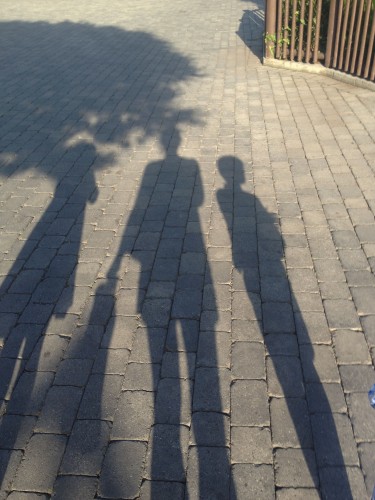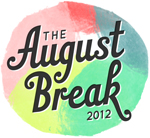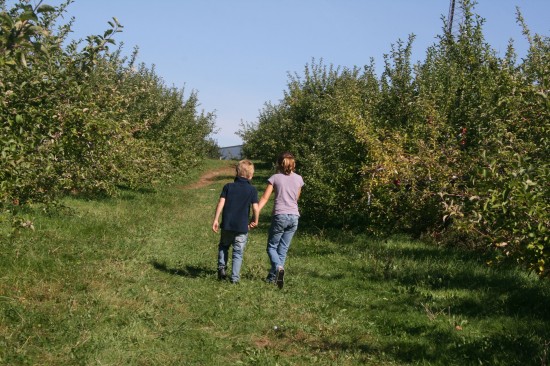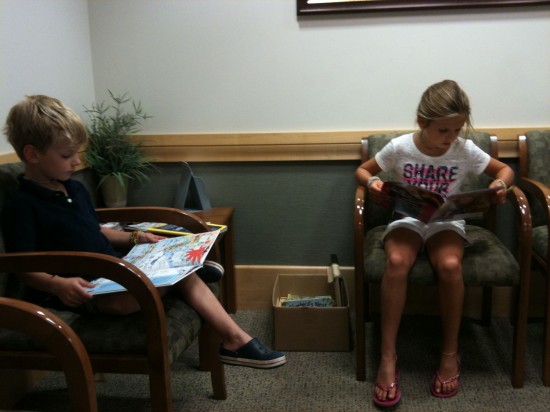
Long shadows as the sun goes down on our last night at Legoland. Light and dark, shadows lengthening, the days growing shorter. The earth spins and spins. And we stand, aghast and amazed, in a little bit of terror and a huge amount of wonder.


Long shadows as the sun goes down on our last night at Legoland. Light and dark, shadows lengthening, the days growing shorter. The earth spins and spins. And we stand, aghast and amazed, in a little bit of terror and a huge amount of wonder.


Most mornings, I walk Grace and Whit into their respective school buildings. Occasionally, if I have to make it to an early meeting or something, I do “live drop off” instead, letting them hop out of the car while I idle at the curb. For some reason this always brings tears to my eyes. There’s something about their backpacks bobbing away from me, their independence, their resolve, their enthusiasm for school – all of it mixes up into a cocktail that brings tears to my eyes as surely as onions on the chopping board or Circle Game on the radio.
The other morning was no different. I drove away, blinking back my tears, and suddenly I thought: these are the years they will remember as their childhood. We had driven to school all belting out Edge of Glory together, and then we had sat in the car near school singing along until the song ended. I looked in the rear view mirror to catch them grinning at each other, overwhelmed again with the realization that tiny things can bring sheer joy for them.
I remember when Grace turned four thinking: okay, this really matters now. That is because my own memories of childhood begin when I am about four. I actually don’t have that many memories of my childhood, and those I do exist in a slippery kind of way: am I remembering the actual event, or the picture I’ve seen so many times of the event? I wonder if part of why I write things down so insistently now is to address this very fact, this inability to remember when I so desperately wish I could.
My flashes of memory, as limited as they are, begin in the second apartment we lived in in Paris. I was four-ish. So, my assumption was that Grace and Whit would start remembering things from the same general time period. Certainly, they will remember these days. The power of the most mundane moments and experiences – something I’ve long believed fiercely in – was probably particularly on my mind after reading The Long Goodbye last week. For sure, O’Rourke’s memoir had me thinking particularly of the memories of our mothers that endure.
And so I drove into Boston, my eyes still blurry with tears, watching the outrageously beautiful trees that line the Charles, the river that throbs through the heart of my home, wondering what it is that Grace and Whit will remember of these days. We are “deep in the happy hours,” as Glenda Burgess put it in her stunning memoir The Geography of Love, and one thing I’m certain of is that it will be the small moments that most sturdily abide. Will they remember the notice things walks, the trips to the tower at Mount Auburn, trapeze school, and chocolate cake for breakfast? Will they remember the hundreds of nights that I read to them, tucked them in, administered the sweet dreams head rub, did the ghostie dance, turned on their familiar lullabies? Will they remember Christmas, and Easter, and Thanksgiving, and their birthdays?
I have no idea what specific events and experiences will be the ones that rise up for my children, out of the dust of the years, some surprising, some familiar. I could easily drive myself insane trying to make sure every single day is stuffed with memories. But I choose not to do that, because, as I’ve written before, the memories that I come back to, rubbing them over in my mind like a hand worrying a smooth stone in my pocket, are almost all from days and moments that were utterly unremarkable, unmemorable, as I lived them. I assume this will also be true for Grace and Whit. So I suppose all I can do is try to be here, paying attention, to the vast expanse of ordinary days we swim in. And to remember, every single day, what an immense privilege each one is.


I always think of their shoulder blades as wings. Their wings, poking through their skin. And his little back has two freckles on it now, marks marring his white, skim-milk skin, my skin. Life beginning to make its mark on my child.
The wings, though, are on my mind today. The wings.
This past winter Whit went through a phase when he slept every night with his hand clasped around the little compass my parents gave him in his stocking for Christmas. I always wondered, when I went in to kiss him goodnight, where his dreams were taking him. Where was he flying, in his sleep, guided by the true north he could always check in his palm?
May they have both a compass and wings, my children. Oh, please, please: never let them lose that physical sensation of wonder, that feeling that I always associate with wings beating in my chest. And please, please: let me help them each find their own internal compass, that needle that tugs north. That internal compass which can be trusted to orient us, no matter what whitewater we tumble in.
I’m still looking for both my compass and my wings, and, oddly enough, my children provide them for me better than anything else in my life. They seem to have both already. Maybe we’re born with our wings and our compass, and the task of our lives, at once simple and enormous, is not to lose them.
I’m particularly aware right now of the intensely opposed polarities that exist, both uneasily and audaciously, in every single minute of my life. It is by turns exhausting and reassuring to hold these contradictions in my hand.
What poles are you holding now?
A while ago I wrote about how I often stopped before things got hard, doubted in some fundamental way that I was not enough for a task in front of me. I want to clarify something important about this. First, I’m not sure that my resistance to really pushing myself – whether physically, emotionally, spiritually, or intellectually – is about fear of failure. It might be about fear of success. It might be abhorrence of discomfort of any kind. I really don’t know, which is why I shared it.
Secondly, when I write “not enough” I mean it in terms of myself, only: my own resources of strength, forbearance, intelligence, trust. I am absolutely not a zero sum kind of person, and I wasn’t speaking about the world.
Last week I re-read Molly Jong Fast’s article in Bazaar about the New York fear of there being “not enough preschool spots, enough Mandarin speaking nannies, enough David Netto-designed $1600 cribs.” The wording of that sentence, the not enough, sent me back here. Sure, I write about my deep anxiety about being safe, but essentially I don’t think there is limited abundance in this world. I really, truly care about supporting others, for example, and don’t do that with any agenda of my own but instead out of a sincere wish to help others. I am not a competitive person, which surprises some people. Ask my husband: he hates playing all games with me, whether tennis or bridge, because I simply don’t care about winning. I am uncomfortable with shows of excess, to the point of over-correction. I believe in my core that one of the best ways to remember how fortunate we are is to give of ourselves: whether it’s to listen to a heartbroken friend, to put a dollar in the guitar case of the man playing on the subway platform, or to cook a meal for the local battered women’s shelter.
I don’t know how I feel about The Secret, and I wouldn’t call myself a law of attraction disciple, but I do believe that abundance begets abundance. I think that there is a great deal of good in the world, and by noticing it, acknowledging it, we can add to it. In a quiet and somewhat dark period of my own life, I am grateful for the reminder of this.